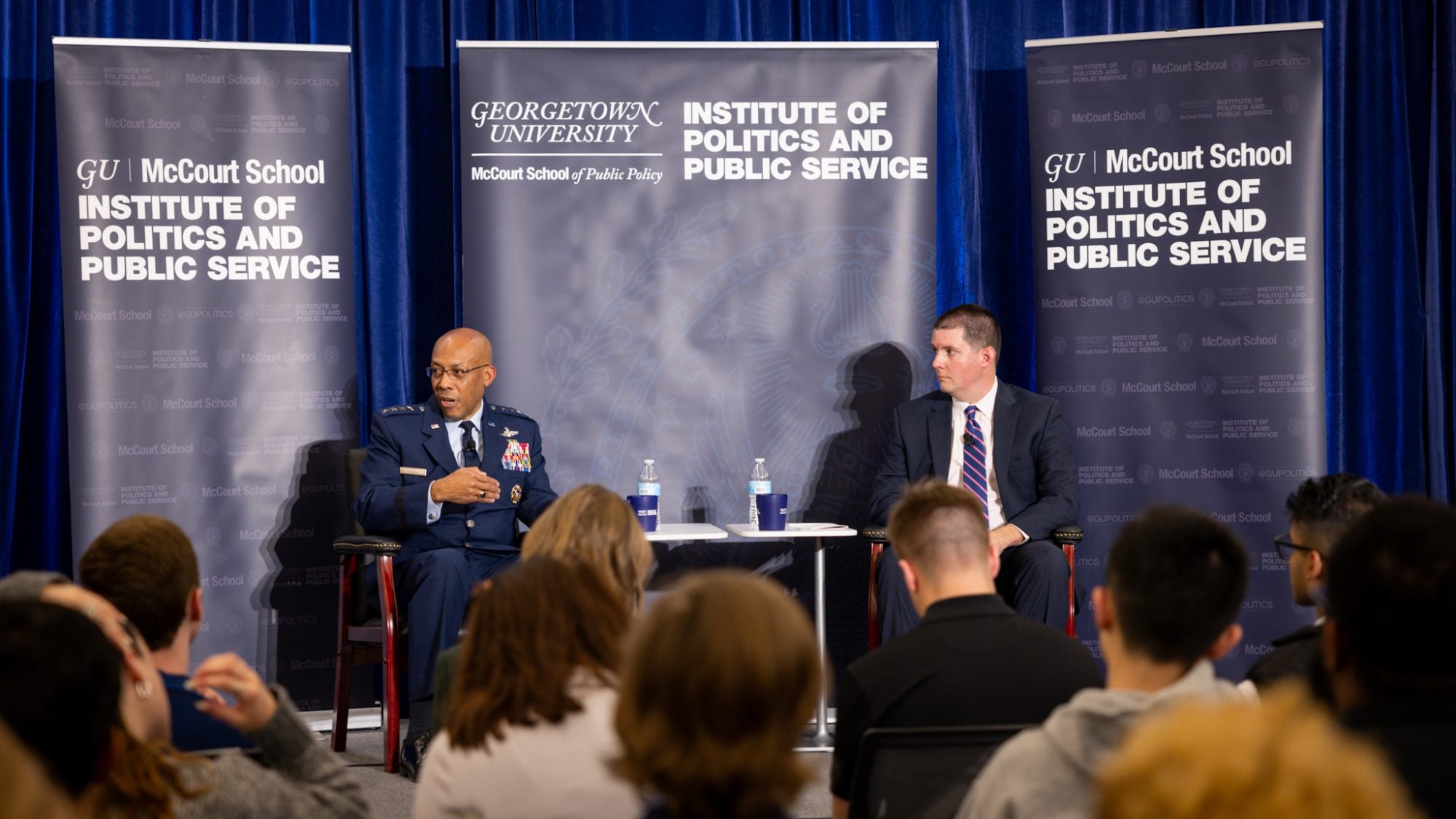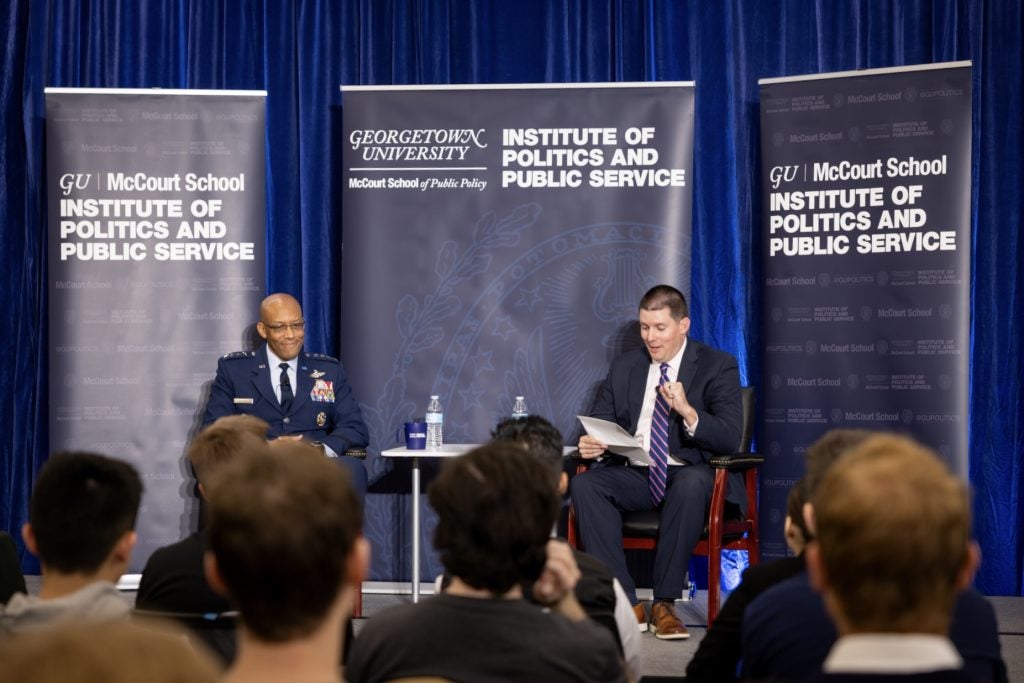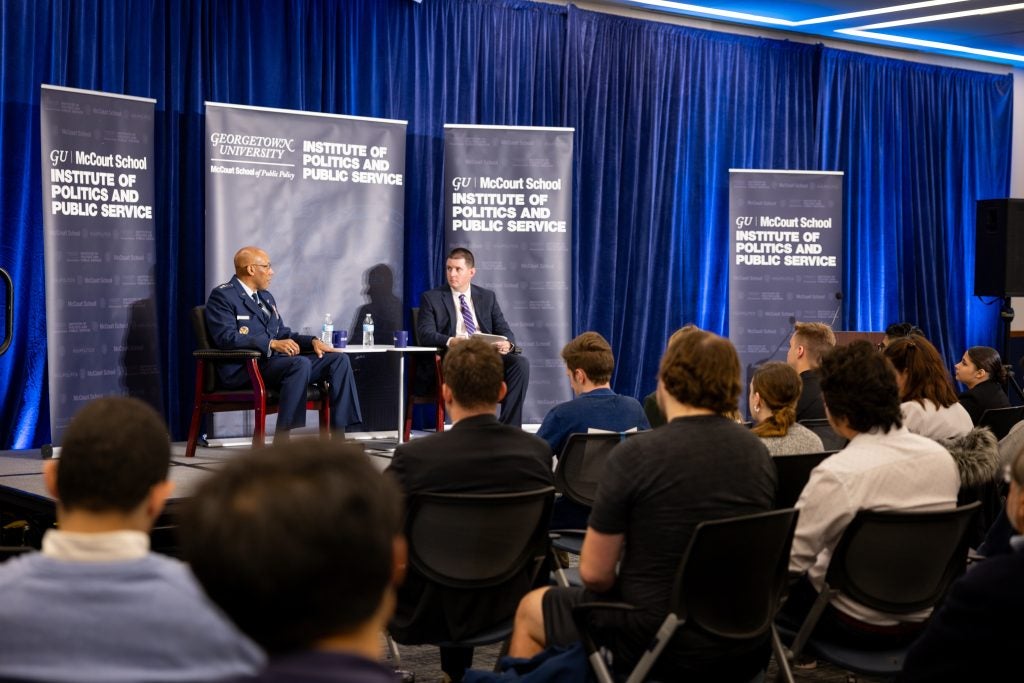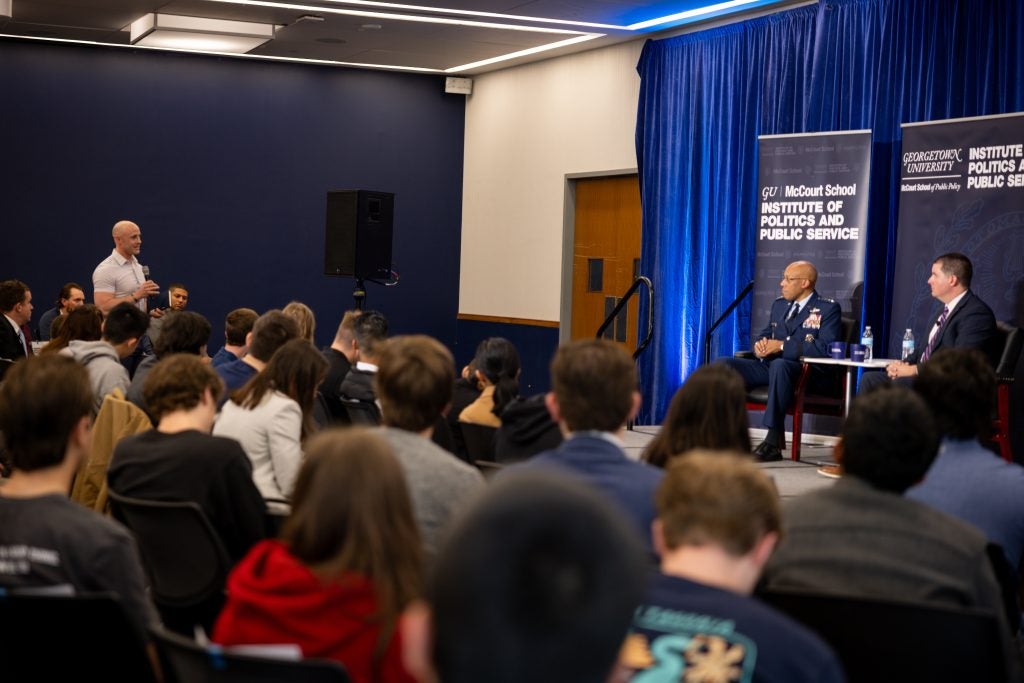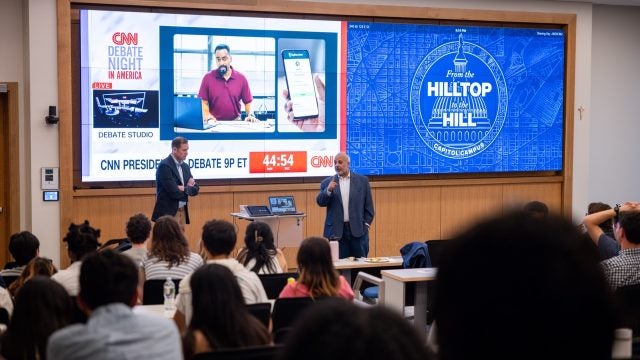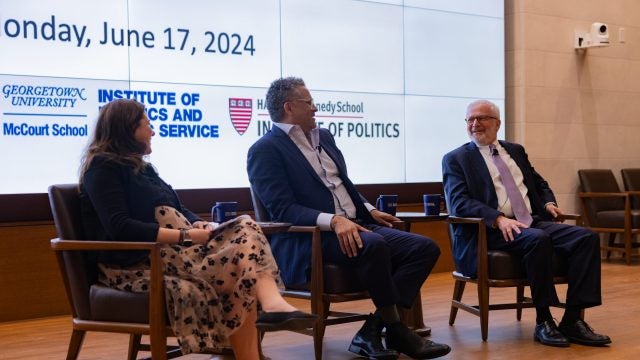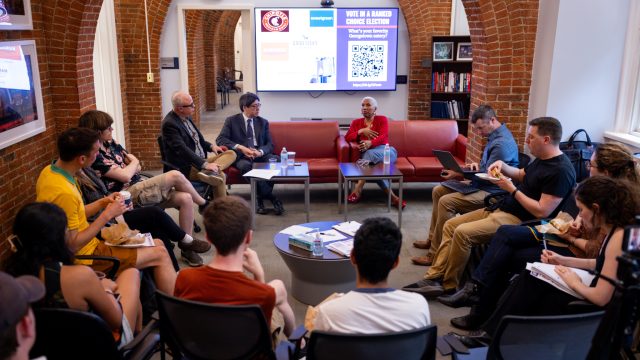On Thursday April 25, 2024 Georgetown students gathered in the Healey Family Student Center Social Room to hear from General Charles Q. Brown, Jr., Chairman of the Joint Chiefs of Staff about the role of the U.S. military in U.S. politics and the world. As the most senior-ranking military officer in the U.S. and military advisor to the President, General Brown shared his experiences as a military leader and students had the opportunity to ask questions.
Vilda Westh Blanc (SFS‘27), a student who was on Dan Lamothe’s Student Strategy Team this semester, introduced the event. She welcomed Brown to the stage as well as current GU Politics Fellow Dan Lamothe to moderate the conversation.
Lamothe started the conversation by asking Brown about the current state of U.S. military operations and the threats to national security. “What makes this time uniquely dangerous, uniquely challenging?” Lamothe asked.
Brown emphasized the complex dynamics of this moment for U.S. national security, noting the significance of threats from North Korea, China, Russia and Iran. He explained that before coming to his current position he championed the phrase “Accelerate change or lose.”
“Personally and professionally, I do not play for second place. And I am very focused on ensuring we have all the capabilities to ensure our national security,” Brown said.
Outlining his priorities for the U.S. military, Brown highlighted the importance of training skilled service members, embracing the modernization of capabilities, and creating a foundation of trust with communities and elected officials.
On the importance of maintaining trust with American people, Brown said “Having that trust is hugely important to ensure that we do the things the nation calls us to do as military members.”
Next, Lamothe asked Brown how the Israel-Hamas conflict shapes the priorities of the U.S. military.
On the tension between current crises and future threats, Brown said “You’ve got to balance risk over time.”
“You never want to take short-term satisfaction at the expense of your long-term goals,” Brown said.
Continuing to discuss the conflict in the Middle East, Lamothe asked Brown about what it takes to deal with such a volatile situation and what strategies the military is utilizing to keep the conflict contained.
“From the very beginning, we looked at how do we deter a future conflict and at the same time protect our armed forces and support Israel to defend itself,” Brown said. “In addition to that is making sure we were providing humanitarian assistance and minimizing collateral damage.”
“This has been a theme throughout: how do we deter a broader conflict,” Brown said. Brown further emphasized the military’s preparedness, the efforts of the U.S. National Security Council, and the role of other foreign nations.
Lamothe then asked about what initial concerns Brown had regarding Iran’s attack on Israel on April 13th.
“First thing I’ll tell you is that I didn’t have a lot of concern because I have complete confidence in our force and they were well-prepared,” Brown said. He emphasized the work of the U.S. military in the week leading up to the April 13th attack and explained the communication and collaboration between the Pentagon and White House that happened the day of.
Turning to the topic of Ukraine, Lamothe noted that despite the recent aid package approved by the U.S. Congress, many think that “Ukraine will continue to be outgunned this year. What do you see as the likely outcome this summer?”
“When Ukraine is supplied, they have been able to be effective,” Brown said, stressing the importance of continuing to provide support.
“Even broader than this: what happens in one corner of the world does not stay in one corner of the world,” Brown added. “Unchecked aggression provides opportunity for future aggression.”
Next, Lamothe asked about building trust in the U.S. military. “We’re in a time where there is dwindling support for the U.S. military in a lot of polls. There are concerns about American democracy at large. What does it take to build new faith in the American military?” Lamothe asked.
“Trust is the foundation of our profession. And part of that, my focus, is not only maintaining the trust we have but to continue to build upon it.” Brown added, “I think the most important thing I can do is lead by example.”
Brown also emphasized the importance of being non-partisan as a military member. “Our oath is to the Constitution of the United States, to an ideal— not to a leader, not to an office,” Brown said.
Students then had the opportunity to ask Brown questions.
Captain Trevor Barton, Omar Bradley Fellow and McCourt Student studying national security issues asked: “What is your assessment, as the Chairman of the Joint Chiefs, of the current health of the defense industrial base related to our production capability, and what can policymakers do to increase the resiliency of the defense industrial base?”
“There’s key things, from a policymaker standpoint, that I think are very important. Consistency is probably top of the notch,” Brown said. “What I mean by that is that there’s consistency in our demand signal from the Department of Defense in what we need. And then consistency in resourcing. When you have that consistency, that helps predictability for the defense industrial base.”
MJ Ninal (C’24), a cadet in the Air Force ROTC, asked Brown about his advice for young lieutenants in this unique time of international threats and political polarization.
“Whatever job you’re going into, get really good at it. That’s probably the most important thing you can do. I’d also say ask a lot of questions. There are no dumb questions,” Brown said. “And when you ask tough questions of your leaders, it challenges us.”
One student asked Brown about the challenges of advising political leaders and what his advice was for fostering mutual understanding of perspectives and positions.
“When providing advice, you need to understand your boss, and your boss’s boss, and their intent and what their focused on,” Brown said. He emphasized that the perfect military solution does not always line up with what is going on geopolitically, economically and diplomatically, but understanding the bigger picture is key to effective conversations and problem-solving.
Lewis Williams III (S’28), a student studying applied intelligence at Georgetown’s School of Continuing Studies asked Brown, “What are some of your role models or individuals that have inspired you, whether civilian or military?”
Brown talked about the influence of his father, who was in the Army and encouraged Brown to apply. “This is all his idea,” Brown said.
“I think the other thing that has been an inspiration to me has been the Tuskegee Airmen,” Brown said, referring to the first African American military aviators in the U.S. “Just in general, what they were able to do leading up to World War II and during World War II.”
Brown recounted his experience getting to talk to some of the Tuskegee Airmen and hear their stories. He remembered Brigadier General Charles McGee and reflected on the honor it was to meet him.
Brown also answered student questions about cybersecurity, use of innovative technologies in Ukraine, climate change as a national security threat, and promoting cooperation between branches of the U.S. military.
Luke Hughes (SFS‘27) asked Brown what his message would be to incoming Georgetown students who are considering joining the ROTC.
On reasons to join, “I would say two things: One, the opportunity to serve your nation but the opportunity to gain some valuable experience,” Brown noted.
Brown emphasized the opportunities for growing as a leader, building meaningful relationships, and giving back to your community through involvement in the military.
“We need you, whether you serve in uniform or you serve in some other part of government, that’s what makes our democracy so strong,” Brown said.
GU Politics extends its gratitude to the Walsh School of Foreign Service, the SFS Security Studies Program, the Georgetown University Military and Veterans Resource Center and the National Defense Policy Initiative for co-sponsoring this event.
This article was written by Jane Wright, a first-year graduate student in the McCourt School of Public Policy.
Watch the full recording below.
